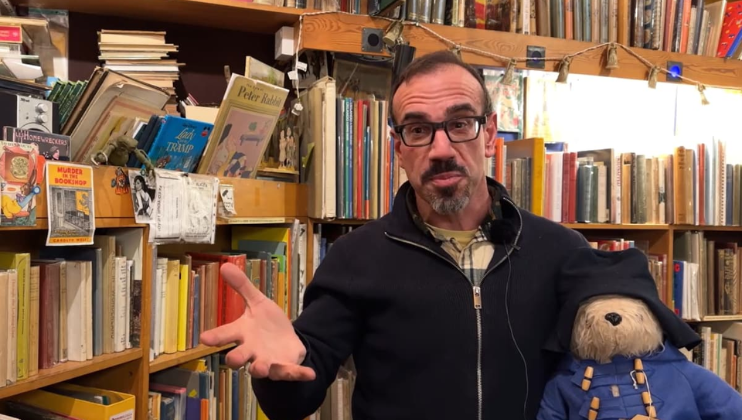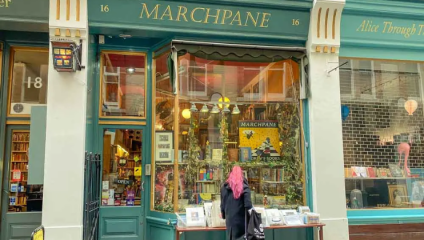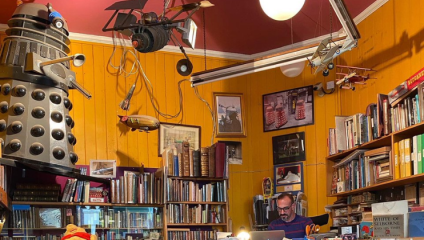An Interview with Dr Matthew Eve of Marchpane Books
Dr Matthew Eve is an author, illustrator, lecturer and chocolatier who runs Marchpane Children's Books in Cecil Court - we talked to him about his love of children's book, the shop, and what it’s like to work in the charming thoroughfare...
By James Stokes | Updated May 10 2024

Culture Calling: What is Marchpane? What's the story behind it, and how did you come to work there?
Dr Matthew Eve: We say we're a specialist in antiquarian children's illustrated books rather than a bookshop for children or, as Americans like to say, a used bookstore; if someone says that to me, I go slightly crazy because it implies the books aren't worth anything!
I first came here with my mum and dad.. we had come up to see a play for my 15th birthday and happened to stumble across Cecil Court. Immediately before Marchpane there was a bookshop here called Images, which was run by a man called Peter Stockham. He specialised in early children's books - chatbooks, broadsheets, 18th and 19th century children's books. Because I had always had an interest in children's books, I came in, and Peter Stockman was quite a formidable, man…slightly frightening...We've tried to keep that ethos all the way through at Marchpane (laughing)!
It became Marchpane in 1989, when the present owner, Keneth Fuller, bought and took over the premises, and it became his shop. But this was also the origins of Foyles bookshop, from 1914 onwards, and before Images it was the music shop Travis & Emery, who are now opposite us. So it's got a very long history of interesting and important bookshops.
When I moved to London in 2000, I was three years into my doctoral thesis at Oxford University, which was about children's books during World War Two. Ken and I shared the same passion for wartime children's books, and I learned a lot from him. Then, somewhere between 2002 and 2005, I came in and chatted to Ken and happened to point out that the shelving looked a little bit untidy, so I I said; “do you not have someone to at least put these into chronological or alphabetical order (because it's a bit of a mess)?” He said “Would you like a job?”, and I've sort of been working here ever since, really, on and off for periods around my other work, and I took on more and more over the years. That's still the ethos of how I employ people to this day!
CC: Can you tell us about your interest in children's literature?
ME: When I was 11, I started to study Faith Jaques' illustrations - she was the very first UK illustrator of Charlie and the Chocolate Factory - and the skill and brilliance of book illustration as an art form in itself. She really inspired me; I wanted to be able to draw like her, and I wrote her a fan letter. My passion for children's literature started at that point, because I then started writing to hundreds of writers and illustrators; I have an innate curiosity for the creation of works of genius and I'm particularly interested in children's books and how they work. For me, the simplest thing was to write to the creators and ask them about their work. I wrote to hundreds and hundreds of writers and illustrators, including Roald Dahl, Raymond Briggs, and Dick King-Smith, who wrote The Sheep-Pig, and Michael Bond (who was a friend) and Dr. Seuss, Maurice Sendak…and so on and so on…and I had the most spectacular replies from them all.
And at that point, at the age of 11, I was really into Inspector Morse and I decided I wanted to go to Oxford University and write a doctoral thesis about children's book illustration. I did my first degree at St. Andrews in English and History of Art, and then I went to Oxford University and I wrote a doctoral thesis about children's book illustration during World War Two.
I was at Christ Church, which was Lewis Carroll's college, and (because we were graduates) the Dean used to invite us to garden parties quite frequently; we used to go and have champagne and nibbles, and there's a big tree in the Dean's garden, and in that tree Lewis Carroll saw a cat, and that became the Cheshire Cat!

CC: What are some of the highlights, advantages and challenges of running a specialist and independent bookshop?
ME: One of the most exciting parts is buying books for the shop; I get so much pleasure from finding unique things, and we pride ourselves on holding rare books - deliciously unusual and spine-tinglingly exciting. I spend most of my life now online and offline, or I go to people's houses, looking for really, really special books. Without doubt we have the largest selection of Alice Wonderland books in the world. We specialise in this and we have done for 35 years - that's Ken's speciality.
The challenge, day to day, is trying to engage the people who come into the shop; finding out if there's something they're looking for and, if I haven't got it, trying to find something that will appeal to them, or that might spark some other interest. If there's a christening present that they want, then I'm able to provide a few different examples, or even maybe push that boat out slightly further and show that, for a touch more money, they could buy something even more beautiful or special. That's one of the perks - it's an enjoyable thing.
[Another challenge is] making sure that you have books that people can't find anywhere else; signed copies of books or, particularly, copies with dust-wrappers - you know, a fairly common book, but with that elusive dust-jacket, something like that.
CC: How does one becomes a bookseller?
ME: That's an interesting question. I think you've got to have the passion for it, and the understanding and the knowledge. Being an antiquarian bookseller is a challenging and deeply rewarding profession; I'm sure people have their ideas about it, or about working in any profession which requires intellect. Despite outward appearances, it does involve more than just sitting all day listening to classical music and drinking tea!
The point of being here is to make sure that you're providing the best service - a better service than other bookshops can provide. There is competition out there. And we have to stand out as something unique, and we do..!
CC: What is it like to work on Cecil Court? Is it full of interesting and eccentric characters (as I suspect)?
ME: Well, we're all totally obsessed with what we do and what we're selling - I live and breathe children's books, and I like to think I bring a sort of academic sensibility to the shop, by being able to speak about things with authority and great knowledge.
Travis & Emery, particularly, has a really fantastic and very unusual collection of multi-talented, multitasking people; one's an internationally renowned composer, there's a drummer, who does session stuff, and there's a harpist. There's also an organ scholar from Oxford who plays at at least fifteen different churches at the weekends, and at weddings. At Christmastime Cecil Court has a late night Christmas party. Charlie (who used to manage Travis & Emery) has the most spectacular choir, and they come and sing Christmas carols for a few hours that evening…I mean…I'm getting choked up because they sound like angels!
It's a tiny microcosm of a community, and a concentration of the most exciting shops - and it's pedestrianised, so theres not the noise of the cars, so I can just shout across the court if I get bored or want to speak to one of my friends, and we can go for a coffee.
CC: There's a Dalek in the corner of the shop. What's the story there?

ME: It's an original BBC prop Dalek from the Genesis of the Daleks. Ken bought the Dalek at Bonhams auction house in 1989. He is obsessed; The Dalek Book was the very first book he was ever bought in 1964, and he was forever equally terrorised and thrilled by the Daleks, and to this day he absolutely loves them. This Dalek is one of the only ones (we believe) to have survived from that earlier period because most of them were blown up. It's something that people remember about the shop - apart from me! It's a sort of special talisman, and it's been loved and seen by people like Russell T. Davis and Catherine Tate and Matt Smith…John Barrowman…all sorts of people from the TV series.
CC: What insights can you give on the arts and culture scene in London?
ME: A friend of mine runs a cafe called Fidelio, in Farringdon - it's astonishing, and since lockdown it has regularly hosted chamber music concerts performed by some of the finest musicians in the world, and this is then followed by an exquisite three-course dinner.. it also hosts literary events and jazz music nights...my lovely friend Raffaello runs that cafe and also his own orchestra, similarly called Fidelio..
The South Bank is doing all sorts of different festivals throughout the year, and there are specialist little literary festivals happening in different places all over the country - that's really, I would say, the hub of how the audience and the creator come together - although there are now plenty of lectures and things like that on Zoom. Irving Finkel, who is the curator of Cuneiform at The British Museum, does a lot of that sort of thing. He'll give a lecture to about 1000 people on the history of Noah's Ark. Now, he's eccentric! He's hysterically funny. He comes into the shop quite frequently. He loves it here.. it's like a meeting of minds!
I know a couple of performance poets, but I couldn't tell you how they get themselves organised… but they have poetry slamming sessions in pubs and can be great fun...
CC: Aside from Marchpane, what would you include in a cultural tour of London?
ME: The Victoria and Albert Museum…the statue of Paddington Bear in Paddington station! The National Portrait Gallery is always fun…The British Museum can't be beaten, either. If youre a bibliophile, go to The British Library first; you'll see things like the Gutenberg Bible, and the manuscript for Alice in Wonderland!
I absolutely adore Sir John Soane's House which is like a film set, a really Gothic house, and it's designed to allow the maximum amount of light in; there are areas of the house where he put bits of glass in the ceiling and stuff like that so more light comes through - and the house is stuffed with the complete painting suite of Hogarth's The Rake's Progress...I mean, what could be more exciting?
Marchpane Books is located at 16 Cecil Ct, Charing Cross Rd, London WC2N 4HE